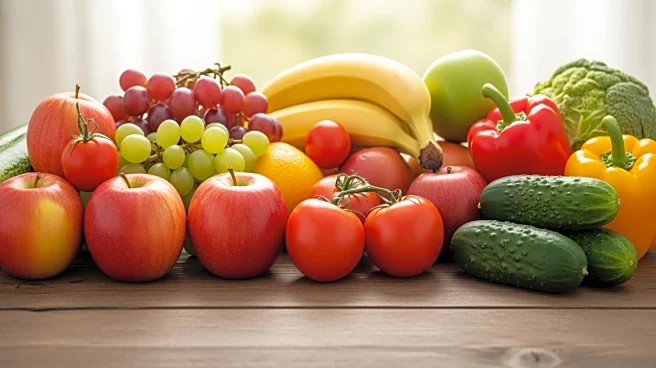What's Happening?
MarketBeat has highlighted seven agriculture stocks that investors should watch closely. These stocks include Deere & Company, Corteva, Bunge Global, Valmont Industries, Cal-Maine Foods, Gates Industrial, and Andersons. These companies are involved in various
aspects of the agricultural supply chain, such as seed and fertilizer production, farm equipment manufacturing, commodity processing, ag-tech innovations, and food distribution. The performance of agriculture stocks is influenced by factors like weather conditions, crop yields, global commodity prices, input costs, and government policies. Recently, these companies have shown the highest dollar trading volume among agriculture stocks, indicating significant investor interest.
Why It's Important?
The agriculture sector plays a crucial role in the U.S. economy, impacting food security, employment, and trade. By investing in agriculture stocks, investors can gain exposure to this vital industry, which is subject to fluctuations based on environmental and policy changes. Companies like Deere & Company and Corteva are pivotal in advancing agricultural technology and sustainability, which are essential for meeting future food demands. The focus on these stocks suggests a growing interest in agricultural innovation and resilience, potentially leading to increased investment and development in the sector.
What's Next?
Investors and analysts will likely continue monitoring these agriculture stocks for performance trends and market shifts. As global challenges such as climate change and supply chain disruptions persist, these companies may adapt by enhancing their technologies and strategies. Future government policies and international trade agreements could also impact the agriculture sector, influencing stock performance. Stakeholders may anticipate further developments in ag-tech and sustainable farming practices, which could drive long-term growth and stability in the industry.
Beyond the Headlines
The emphasis on agriculture stocks underscores the broader economic and environmental implications of investing in sustainable and innovative farming practices. As the industry evolves, ethical considerations regarding food production, resource management, and environmental impact will become increasingly significant. Companies that prioritize sustainability and technological advancements may lead the way in addressing these challenges, potentially reshaping the agricultural landscape and influencing global food systems.
















